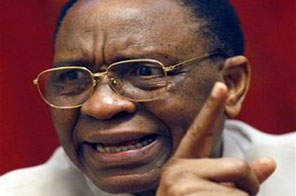Armed soldiers storm Niger presidential palace
NIAMEY: Armed soldiers stormed the presidential palace Thursday afternoon and witnesses said the president was missing after heavy gunfire in the capital of the uranium-rich West African nation.
The violence comes just months after a referendum was passed allowing President Mamadou Tandja to extend his rule for years past the constitutional limit.
Moussa Mounkaila, a palace chauffeur, told The Associated Press that the gunmen showed up as a meeting of government ministers was taking place at the presidential palace.
A local journalist who was working there, Traore Amadou, said Tandja's whereabouts were unknown.
Government officials could not be reached for comment. National radio did not mention the developments in an afternoon report.
A French diplomat declined to comment on the situation, saying the French government is still trying to determine what is happening and what the risks are. The diplomat spoke on condition of anonymity because the situation is still unclear.
The opposition had protested the August 2009 referendum, saying it granted Tandja near-totalitarian powers. Tandja claimed he was only pushing to stay in power because his people had demanded it.
After three coups hit Niger between 1974 and 1999, Tandja twice won votes deemed fair. But in the waning months of his final term, he has gone down the path of many long-serving African despots, breaking a promise he had frequently made to step down when his term expired in December.
Troubles began in late May, when he dissolved parliament because it opposed his referendum plan. The move was legal, but in June, he invoked extraordinary powers to rule by decree. The constitution, however, says he could only do so if the nation is facing a dire threat and parliament is in place to monitor abuse.
Days later, the constitutional court ruled his referendum call illegal. Tandja responded by issuing a decree replacing the court with another, whose members he chose.
Niger is ranked fifth from last on the U.N.'s worldwide human development index and has an astounding 70 percent illiteracy rate. The nation on the Sahara's southern edge has been perpetually battered by drought and desertification. And these days, it has the world's highest population growth rate.






